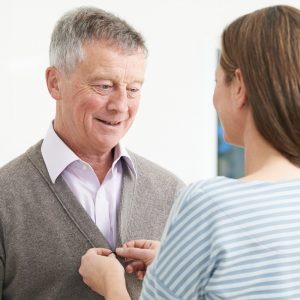“Bump, set, spike,” I shout in support to the girls at volleyball practice. It’s a weekday evening, and I have the privilege of assistant coaching my daughter’s volleyball team.
As the girls work together as team, I try to stay focused. But my thoughts are consumed by the phone call I just received from my dad, Wally, on my way to practice. He told me his cancer had spread and there’s nothing more they could do.
This is my story of the journey and how I helped my dad through his illness and eventual death. Many people loved my dad, and numerous family and friends supported and cared for him during his life, and especially during his illness. I will be forever grateful to them for their support.
My dad was diagnosed a few years prior to that fateful call, when a small nodule was detected on one of his lungs. He bravely endured chemotherapy and radiation treatments, and the nodule was no longer visible on the CT scan. We realized when the cancer had returned, the day we hoped for a cure would never come. My dad was terminally ill—and there were 500 miles separating us.
So many questions raced through my mind.
- How can I help him from here?
- Who will help him from there?
- What will happen if he can no longer live alone?
- Who will make decisions for him?
- How will I know when to go?
The answer came to me in the middle of the night. Dad had to unlock the answers to these questions for himself first. I had to tell myself to slow down and take a step back. The decisions that needed to be made were my dad’s to make, and it was important for me to respect him and his choices.
The challenges of caring from afar brought forth many things to consider:
It is important to discuss care choices as a family.
The diagnosis of a life-limiting illness in a loved one marks a new chapter in a family’s life. Challenging decisions and important choices arise along with uncertainty and fear. With the execution of an advance directive (durable power of attorney and living will), you are communicating legal instruction for your end-of-life wishes. This can be incredibly helpful to your family when hard decisions need to be made.
I was thankful my dad took time to make a plan that included completing an advance directive, which documented his health care and end-of-life decisions wishes. Finding answers requires asking the hard questions and engaging in conversations about one’s wishes for end-of-life care.
To my surprise, these types of conversations with Dad were effortless. Dad allowed me to communicate with his doctor when I had questions about his medical care. Having worked at Hospice of the Red River Valley for several years, I knew having hospice care in place would provide comfort and support for Dad, and advocated for him to be referred to a hospice near his home in Wisconsin.
Hospice made it easier for him to manage day by day at home. Even though he didn’t like many people coming into his home, he spoke fondly of his nurse, Debbie, and the hospice chaplain. They offered such a sense of reassurance to our family.
By engaging Hospice, I was contacted regularly by his nurse with updates and any changes or concerns. Throughout the entire process, Dad was open and expressed his wishes. This precious time, helping my dad through his final journey, turned into a blessing for us both as our conversations were rich and deep with meaning.
Determine your loved one’s circle of support.
Make friends, neighbors, family members aware of your loved one’s condition so you have a network of support when you need someone to check in on your loved one. Those same people may also be willing to assist with errands and transportation to appointments for your loved one. Make sure you also obtain their contact information.
Dad had a wonderful group of friends who made daily “happy hour” visits to see him. A North Dakota native, Dad took a job as an electrician in Wisconsin in the 80’s and settled on a small hobby farm with horses making Wisconsin his permanent home.
With all of his family more than 500 miles away, his circle of friends, neighbors and church family became invaluable to us when Dad was sick. He had ample offers from people to grocery shop, accompany him to appointments, assist with housekeeping, and most importantly, offer friendship and support. I appreciated his friends’ regular contacts with me to let me know how he was doing.
Even though Dad and I talked frequently, Dad did not want me to worry so tended to minimize how he was feeling.
Stay connected.
Most long-distance caregivers would like to be able to spend much of their time with their loved one; however, they often struggle with an internal “tug of war.” The pull between personal matters, such as work responsibilities, family and home life, and the thought of your loved one’s comfort, safety and well-being are constantly on your mind.
My dad and I kept in contact through phone and email. He had become quite fluent in using his computer for emailing, bill paying and surfing the web. Our email correspondence proved to be a gift to me. I have a stack of emails from Dad that I printed out and keep at my house. The exchanges included current events, updates on family happenings and politics, but most important to me were the emails with more depth and feelings of love, gratitude and faith. As I look back, these communications are precious memories and treasures to me.
Deciding when the right time is to visit can be challenging.
One of the most difficult aspects of long-distance caring is determining when to make the trip to see your loved one.
Dad and I had several conversations about the possibility of him moving back home to be closer to family. His wanted to stay in his home, and we respected his choice. Our family traveled to see him at the start of his illness, when treatment changed and when his condition worsened. My dad’s siblings also made the trip to spend time with him. I was so blessed to have my dad’s sisters as travel companions. One or both of them would always accompany me to see Dad, even on short notice.
I recall being notified that Dad was admitted to the hospital for weakness and dehydration. I called my Aunt Bev to let her know what had happened and that I was heading out in the morning to go to him. She called me back less than 10 minutes later and told me she broke down crying, and told her husband she couldn’t let me go alone. Bev packed her bags that evening, and we left for Wisconsin in the morning.
We made several road trips to see him, but the last visit to see Dad was by plane. I received a call from his hospice nurse stating his condition was changing significantly. My Aunt Grace and I flew out on a Monday morning, and Dad died peacefully the following Saturday surrounded by a few close friends, his pastor, Grace and me.
Self-care and support are crucial.
Caring for someone both near and from afar can be physically and emotionally exhausting and can leave one feeling weary in body, mind and spirit. While it is important to know the circle of support for your loved one, it is also important to lean on your own circle of support in your life.
Coping with the many emotions you are feeling as you anticipate the loss of a loved one can be overwhelming. Maintain a healthy diet, drink plenty of water, make an effort to get adequate sleep and try to fit in some exercise, as well.
The emotions tied with life that must go on don’t need to be felt in isolation. These emotions are part of the journey. Accept the support and comfort of others. We place a high value on self-sufficiency; however, it is important to ask for, and accept, the support and assistance of others.
I am forever grateful for the love and support my husband, daughter, siblings, aunts, uncles and cousins showed to my Dad and me. I am thankful we pulled together as a family, supporting one another, during this sacred journey. I am also grateful for the support of my Hospice coworkers for their unwavering support throughout my personal hospice experience.
Everyone worked together for a common goal, much like the team work my daughter and her friends displayed during that evening volleyball practice when I first learned my dad’s illness had returned.
Dad lived a life of simplicity; material things were not important to him. In one of our many email conversations, Dad said, “Faith, family and good friends is what it comes down to.” I’m so happy to say we could fulfill my dad’s end-of-life wishes making sure we honored his faith, family and friends to the very end.
About Hospice of the Red River Valley
In 1981, Hospice of the Red River Valley was founded on the belief that everyone deserves access to high-quality end-of-life care. We fulfill our nonprofit mission by providing medical, emotional, personal and spiritual care, as well as grief support to our patients, their families and caregivers during a tender time in life. Our staff helps those we serve experience more meaningful moments through exceptional hospice care, 24 hours a day, 365 days a year, wherever a patient calls home. The organization serves more than 40,000 square miles in North Dakota and Minnesota, including in and around Bismarck, Detroit Lakes, Devils Lake, Fargo, Fergus Falls, Grand Forks, Lisbon, Thief River Falls, Valley City and many more communities. Hospice of the Red River Valley offers round-the-clock availability via phone, prompt response times and same-day admissions, including evenings, weekends and holidays. Contact us anytime at 800-237-4629 or hrrv.org.



